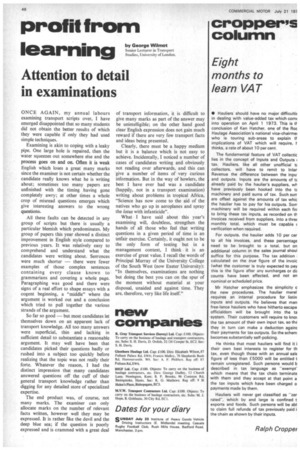cropper's column
Page 48

If you've noticed an error in this article please click here to report it so we can fix it.
Eight months to learn VAT
• Hauliers should have no major difficultic in dealing with value-added tax which COMf into operation on April 1 1973. This is th conclusion of Ken Hatcher, one of the Roe Haulage Association's national vice-chairmei who is touring sub-areas to explain th implications of VAT which will require, h. thinks, a rate of about 10 per cent.
The fundamental feature of VAT collectic lies in the concept of Inputs and Outputs I tax. Hauliers, like all other unofficial tc. collectors, will have to remit to Inlan Revenue the difference between the inpu. and outputs. Inputs are the amounts of te already paid by the haulier's suppliers, wh have previously been hooked into the tt machinery and paid sums of tax. Such sun. are offset against the amounts of tax whic the haulier has to pay for his outputs. Som machinery will be required within each fini to bring these tax inputs, as recorded on th invoices received from suppliers, into a thre( monthly total, which must be capable verification when required.
For outputs, the haulier adds 10 per cer to all his invoices, and these percentage need to be brought to a total, but on additional column in the sales journal shoul suffice for this purpose. The tax addition I calculated on the true figure of the invoic (what the customer is truly expected to pay this is the figure after any surcharges or dit counts have been effected, and not an nominal or scheduled price.
Mr Hatcher emphasizes the simplicity o the new procedures. The haulier merel. requires an internal procedure for listin inputs and outputs. He believes that man free-lance hauliers who have hitherto escape officialdom will be brought into the ta 'system. Their customers will require to kno% the tax amount of their own input tax, so the' they in turn can make a deduction again: their payments for tax outputs. So the schem becomes substantially self-policing.
He thinks that most hauliers will find it i their own best interests to register for th tax, even though those with an annual sale figure of less than £5000 will be entitled t remain unregistered. Such persons would b described in tax language as "exempt' which means that the tax chain terminate with them and they accept at that point a the tax inputs which have been charged o payments made by them.
Hauliers will never get classified as "zer rated", which by and large is confined t exports and foods. Such persons will be abl to claim full refunds of tax previously paid i the chain as shown by their inputs.
Ralph Croppel




























































































